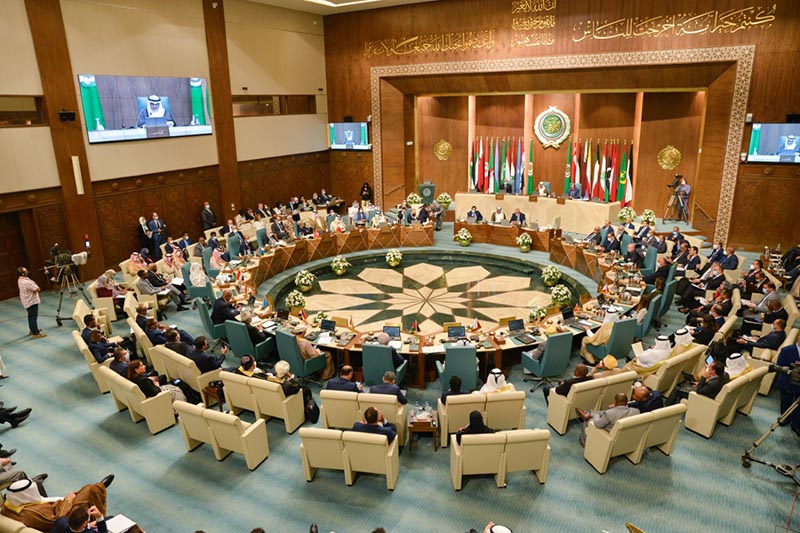 CAIRO: Kuwait’s Foreign Minister and Minister of State for Cabinet Affairs Sheikh Dr Ahmad Nasser Al-Mohammad Al-Sabah speaks during the 156th regular session of the Arab League Foreign Ministers that was chaired by Kuwait on Thursday. — KUNA
CAIRO: Kuwait’s Foreign Minister and Minister of State for Cabinet Affairs Sheikh Dr Ahmad Nasser Al-Mohammad Al-Sabah speaks during the 156th regular session of the Arab League Foreign Ministers that was chaired by Kuwait on Thursday. — KUNA
CAIRO: Kuwait’s Foreign Minister and Minister of State for Cabinet Affairs Sheikh Dr Ahmad Nasser Al-Mohammad Al-Sabah said that Kuwait’s policy, in line with the directives of His Highness the Amir Sheikh Nawaf Al-Ahmad Al-Jaber Al-Sabah, is proceeding with unifying the Gulf and Arab body. Sheikh Ahmad Nasser made the statement to the press at the end of the 156th regular session of the Arab League Foreign Ministers that was chaired by Kuwait on Thursday.
The Al-Ula Summit created a new consensus spirit amongst the region’s countries, he said. He stressed the importance of building on the summit’s results and boosting commonalities, affirming that Kuwait is moving forward in this way. Kuwait was honored to chair the Council of the League of Arab States for six months ending in March 2022, he said. He noted that the meeting was “fruitful” and full of deep discussions as it discussed all challenges and issues facing the Arab world, mainly the coronavirus and its repercussions on the Arabs.
There is a unified vision on enhancing solidarity amongst the Arab health institutions, he affirmed. The Kuwaiti minister went on to say that there is a full understanding that “there is no immunized country if all of us are not immunized”. The gathering witnessed a frank discussion amongst all Arab brothers on challenges facing the Arab region, topped with the Palestinian cause, he pointed out. He emphasized full interaction from all countries to refer the cause to the next UN General Assembly meeting planned at the end of this month. In addition, he elaborated, the conferees discussed the crises in Yemen, Syria and Iraq, and the recent developments in Libya. He finally referred that they focused on the distinguished bonds and ties between the Arab League and the African Union.
Joint action
Sheikh Dr Ahmad had earlier underlined the keenness of Arab states, including Kuwait, to boost joint action. Speaking to a press conference after chairing the ministerial talks, the minister said, when asked about Kuwaiti efforts to mend the rift between Algeria and Morocco, that his country has “great confidence in all the Arab leaderships, and their ongoing endeavor to boost joint Arab action.”
“Kuwait and other Arab countries will play their role in this field to strengthen Arab reconciliation, solidarity and cohesion,” he explained. The minister recalled the Al-Ula summit in Saudi Arabia, which closed the chapter on a feud between Gulf states that lasted over three years, mentioning the emergence of a “new Arab spirit in dialogue and reconciliation, which aims to find common denominators to build upon.” The ministerial discussions were characterized by “brotherhood and admiration,” he said, but conceded that “it is not healthy for 21 countries to come together and agree on everything.”
On the top of these discussions was the “primary Arab issue,” the Palestinian issue, namely the Zionist entity’s continuing breaches on the rights of Palestinians in occupied territories, he said, stressing the need to continue shedding light on these violations. The minister made significant reference to the events in late May, “whether the events of Sheikh Jarrah or what happened in the occupied territories or Gaza, and the Zionist violations for more than 73 years.” Regarding the matter, Arab states agreed for there to be “significant participation” at upcoming United Nations General Assembly meetings, he revealed.
Similarly, he underlined the importance of ensuring sustainable support for the UN Relief and Works Agency (UNRWA) in its bid to provide humanitarian support to Palestinian refugees, unaffected by political agenda. Alongside this, ministers discussed the developments in Lebanon, Syria, Libya, Yemen, Sudan, Somalia and the Comoros, alongside Iran’s occupation of the three Emirati islands, Greater Tunb, Lesser Tunb and Abu Musa. Other matters included the security of navigation and the transport of energy supplies in Arab Gulf waters, Iran and Turkey’s interventions in the internal affairs of Arab states and establishing a nuclear weapon-free zone in the Middle East. The minister also said that the matter of Arab-African cooperation took a “large space” of the discussions throughout several Arab meetings, positively reflecting on the two regions’ close proximity in terms of “geography, human-to-human communication, customs, tradition, faith and mannerisms.”
Arab-UN meeting
At the same press conference, Arab League Secretary General Ahmad Abul-Gheit said an Arab Troika would convene with members of the United Nations Security Council on September 22 to mull the situation in the region, particularly the occupied Palestinian territories. The Arab Summit Troika — the Kingdom of Saudi Arabia, Tunisia, and Algeria — and the UNSC members will hold their meeting in New York on the sidelines of the coming UN General Assembly meeting, the Arab League chief said. Abul-Gheit thanked Tunisia, the Arab member at the UNSC, for arranging the meeting.
On the coming Arab summit, he pointed out that it would be held next March in Algeria. He noted that the UN Palestinian refugee agency (UNRWA) is struggling with acute financial crisis, with a budget shortfall estimated at approximately $100 million. Arab countries with a financial ability like Kuwait, Saudi Arabia, Algeria and Egypt are remarkably contributing to the UNRWA budget, he argued. The Arab League chief criticized the Zionist entity’s Prime Minister Naftali Bennet for opposing any attempts to resume negotiations for a political settlement with Palestinians. — KUNA
.jpg)



